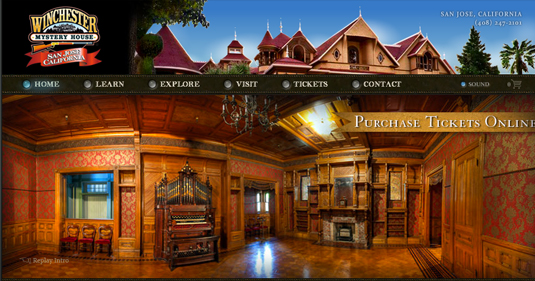How to Build a Javajam Coffee House Website
Why planning a website is like building a house

There is a bizarre 160-room mansion in Northern California called the Winchester Mystery House.
This curious home was continuously under construction from 1884 to 1922 without a master building plan and is full of inexplicable traps such as stairs leading into the ceiling and doors opening onto walls.
The experience of exploring the Winchester Mystery House is disorienting by nature. Without blueprints or a building strategy, there was no logic to the organization of new rooms or features. There was no intended path for visitors to take, resulting in confusion and, no doubt, anxiety.
The story behind the home's conception could have been pulled straight from the pages of an old, eerie fairy tale - complete with a widow, ghosts, and endless superstition, the result of its haphazard thirty-eight year construction should be used as a cautionary tale for digital architects.
Laying the foundations
The strategy behind construction of a home and a digital application are not all that different from one another. While blueprints are designed for the functional organization of a home to be livable, information architecture, content strategy and user experience design converge to form blueprints that guide and structure our digital applications. As digital architects, we strive to avoid the types of experience pitfalls that the Winchester Mystery House has created.
To build the digital blueprints of a website or application, we begin by devising an information architecture (IA) that facilitates the path of our users to conversion - each page of a website being comparable to the room of a home.
Filling the rooms
Next, an engaging content strategy that is relevant and valuable to our users - copy, images and video filling up the pages of a website like furnishings filling up the rooms of a home.
Finally we produce an intuitive and accessible user experience (UX) design) The intention of strategic UX is to establish the hierarchy and functionality of content - optimizing its relevancy and impact.

Our UX should allow users to traverse the digital application in a purposeful way, being presented with the right content in the right place at the right timelike children's books being placed at the bottom of a bookshelf so that tiny arms can reach them.
Remodelling
The importance of a well thought-out digital blueprint is paramount. When your client is ready to remodel by adding or removing pages content, your digital blueprint is more important than ever. Without an experiential strategy to follow, your website could end up an online equivalent of the Winchester Mystery House.
The bottom line is that users will have experiences when they visit websites, whether we plan them or not. So, we should architect purposeful experiences from the ground up to optimize conversions, accomplish KPIs, and give users what they want.
A digital blueprint can and should be utilized long after the foundation for a website is poured. It will guide a team through production to a successful result that is flexible enough to be remodeled while maintaining the strategic drive that holds it together.
- Learn more about the Winchester Mystery House here.
Words: Rachel Guthrie-Maynard
Rachel is a User Experience Architect and Web Developer for Sq1 . She is a nerd for digital strategy and loves '70s music, all things paranormal, and a nice cold gin & tonic within arm's reach.
Liked this? Read these!
- The best collage maker tools - and most are free!
- Free graphic design software available to you right now!
- Download the best free fonts
Related articles
How to Build a Javajam Coffee House Website
Source: https://www.creativebloq.com/netmag/why-planning-website-building-house-31410914
0 Response to "How to Build a Javajam Coffee House Website"
Post a Comment